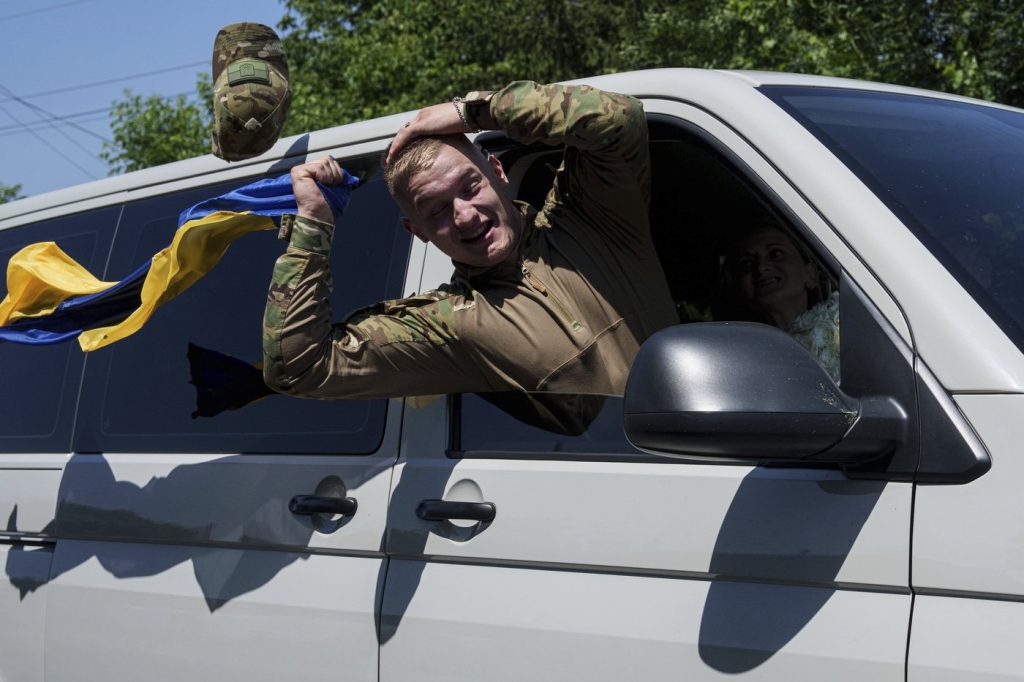KYIV, Ukraine — Since his release from a Russian prison in April 2023, Stanislav Tarnavskyi has been eager to rebuild the life he envisioned while enduring three years of captivity. The 25-year-old has proposed to his girlfriend, purchased an apartment, and adopted a golden retriever—all within a single week in July. However, despite these joyful developments, Tarnavskyi struggles to overcome the trauma of his experiences as a prisoner of war (POW).
The U.N. reports that many POWs, including Tarnavskyi who was captured during the battle for Mariupol in April 2022, faced severe maltreatment at the hands of their captors, which leaves lasting psychological scars. Tarnavskyi recounts having nightmares about his time in prison, filled with visions of the officers who oversaw his detention. "I see the officers who watched over us. I dream they want to harm me," he stated, noting that upon waking, he often feels a rush of anxiety, only to realize he is safe in Kyiv, having moved there because his hometown of Berdiansk was occupied by Russian forces.
As the war continues, Tarnavskyi is among over 5,000 former POWs in Ukraine receiving rehabilitation and counseling services. Experts emphasize the importance of ongoing psychological support for years following a former POW’s release, as the emotional toll of war can reverberate for generations.
Tarnavskyi's recovery process involved a significant personal milestone: a surprise marriage proposal to his girlfriend, Tetiana Baieva, at a photography studio in Kyiv. Holding a bouquet of pink roses and a ring, he expressed his love and gratitude for her unwavering support during his captivity. He credits Baieva with helping him resist the urge to end his life on three separate occasions while he was imprisoned.
Despite the happiness of his proposal, Tarnavskyi still finds it challenging to discuss his prison experiences. He feels uncomfortable with the idea of being pitied. After returning home, he dealt with paranoia stemming from the constant surveillance he experienced while imprisoned. "If you stepped out of line, they'd (Russians) come and beat you," he recalled. Although he faces flashbacks triggered by the sight of surveillance cameras, his therapy sessions have facilitated some improvements in his mental health.
Psychologist Kseniia Voznitsyna, director of Ukraine's Lisova Polyana mental health center for veterans, explains that even minor stimuli can provoke traumatic memories for former POWs. Contrary to common misconceptions, these veterans are not generally more aggressive. Instead, they tend to withdraw socially, avoid large gatherings, and have difficulties with trust. "They say time heals—five or ten years, maybe—but it doesn't," stated Voznitsyna. "It just feels less intense." A 2014 study found higher mortality rates and chronic illnesses among ex-POWs over a prolonged period, underscoring the need for comprehensive medical and psychological care as they age.
Denys Zalizko, a 21-year-old former POW back in Ukraine for less than three months, also recognizes the extent of the long road ahead in his recovery. Having suffered torture and relentless abuse during 15 months in Russian captivity, he reflects, "You can’t fool yourself. Even if you really want to, you will never forget. It will always haunt you." When Denys first saw his mother, Maria Zalizko, after release, she struggled to recognize him due to his frail condition, describing him as appearing "broken." Although his physical health has improved significantly—his skin looks healthy, and he possesses renewed energy—he still carries an emotional weight that is evident in his eyes.
Music and exercise have emerged as vital coping mechanisms for Zalizko. "Pauses and stillness bring anxiety," he shared. Like Tarnavskyi, he is receiving mandatory counseling at the Lisova Polyana center and grappling with hypervigilance, continuously scanning his environment for potential threats. His nights are restless, a condition exacerbated by increased drone attacks in recent weeks.
The reintegration process poses challenges not only for former POWs but also for their families. Maria Zalizko has been advised by a psychologist to give her son space, yet it is often Denys who initiates contact, sometimes singing to her over the phone—a skill she nurtured in him as a child. "I love music. Music unites," he remarked, explaining that even in captivity, he would quietly sing and compose songs in his mind about love, home, and the horrors of war. Now, Denys aspires to pursue a career as an artist, motivated by his musical passion.
Looking to the future, Zalizko asserts, "I've become stronger now. I’m not afraid of death, not afraid of losing an arm or a leg, not afraid of dying instantly. I fear nothing anymore."











